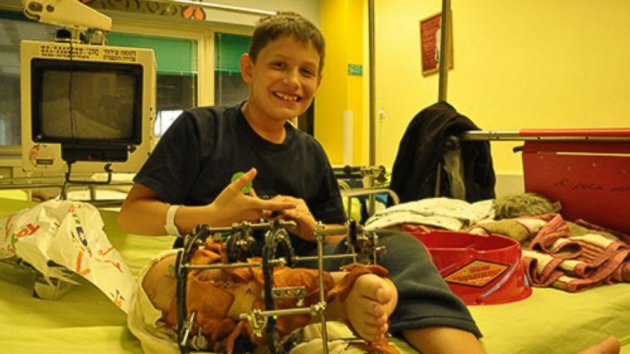Boy, 11, Gets His Wish for Leg to Be Amputated
By SUSAN DONALDSON JAMES | Good Morning America – 2 hours 35 minutes ago
Mother of four Zimra Vigoda said the hardest decision she ever made was to agree to have her 11-year-old son Amit’s leg amputated.
Amit was born with a rare orthopedic condition, congenital pseudoarthrosis of tibia and fibula with osteofibrous dysplasia, which causes his right leg to continually fracture. At one point about 18 months ago, he would wake up twice weekly in excruciating pain with night terrors.
“I awake to a familiar screech. ‘Mommmmmyyyy……HELP!’” Vigoda writes on the blog, Kveller.com. “’Mommmmmyyyy……I want to cut it off, I can’t stand it anymore…I hate my leg….make it stop,’ he hollers, eyes wide open yet not quite awake.”
Amit is in constant pain with a rod in his leg, and can only walk with crutches or hop on one foot or crawl. He’s had multiple surgeries as doctors have tried, among other things, “an inquisition-like procedure called external fixation–or in plain language, rods, nuts, and bolts through the bone, muscle, and skin," writes his mother.
These treatments last about a year, then Amit gets another fracture. Growing up, he was never allowed to jump or play any contact sports for fear his fragile leg will break.
But on April 10, he is scheduled to have a below the knee, Syme’s or ankle disarticulation amputation at Shriner’s Hospital for Children in Sacramento. Six weeks later, doctors will fit him with a prosthetic and three months later, he will be “up and running … well, walking,” Vigoda, 45, told ABCNews.com. “He’s going to have a life with no limits.”
Amit told ABCNews.com, “I am a little bit afraid, but I have been through so much, it’s just like another surgery – except it will change my life. I won’t have any pain anymore and I can run and jump and play soccer.”
“He is still ready before I am, but his father and I are supporting him,” said Vigoda, who lives with her children, aged 6 to 15 in San Francisco’s Bay Area. “We’ll never know if this is the right thing."
When Amit was 7, his doctors recommended he have his leg amputated. But Vigoda confesses she wasn’t ready.
Doctors told the family, “It’s not your decision any more," she said. "When he was 2, it was your decision and now it’s not.”
On his own Tumbler blog, Amit shares his enthusiasm about upcoming surgery with his followers on a video: “I want to wear shorts to school because I want to get the kids ready, because in a couple of weeks I am going to come to school with a case without a leg. I can’t wait.”
Amit’s condition was discovered when he was born with a broken leg. Most children with the condition don’t have fractures until “a year or two later,” said his mother.
Doctors presented three options: let the leg heal by itself; initiate surgeries that would likely end in amputation; or amputate at the age of 1 or 2, so he could “lead a regular life,” said Vigoda.
“I almost fainted as I was holding this baby that had just been born and someone says take his leg,” she said.
In the end, they opted for multiple surgeries. In one procedure at age 9 or 10, he was in contracture for seven months, in a wheelchair, and then had to learn to walk again with a brace.
Other parents have chosen to amputate earlier.
Andy Hovis Wagler, moderator for the Congenital Pseudoarthrosis Support Group on Facebook, said her family chose to amputate their daughter Ayden's leg at age 3.
“She is doing fantastic," Wagler told ABCNews.com. "She was diagnosed when she was 8 months old. Her leg broke while in a brace by 10 months. We braced her until she was 3 and it showed no signs of healing. So we made the decision to amputate at that time to give her a better quality of life.”
Ayden now has a prosthetic and has started t-ball. “She can do everything now … dance, cheer clinics,” said Wagler, 38, who lives in Odon, Indiana. “You name it, she will try it.”
As for Amit, he has watched his two older brothers play competitive soccer and longed to join them. For the time being, he has discovered wheelchair basketball and has excelled in the sport. “His coach is a four-time Olympic player and an inspiration to him,” said Vigoda. “He doesn’t let too much self-pity go on.”
In elementary school, Amit was teased for his disability. “A bunch of boys would yell, ‘Catch me if you can,’” said Vigoda. “They would limp like he did – kids can be cruel.”
But now, in the sixth grade at a Realm Charter School in Berkeley, “he makes friends everywhere,” she said. “He’s a leader and the kids respect him.”
And just last week Amit’s school awarded him with a surprise award for “grit -- showing perseverance and hard work despite constant pain!"
Vigoda, who works for the Israel-based Arab-Jewish Center for Equality, Empowerment and Cooperation, said she has “internalized” the idea of empowerment in her own life. “I hope that it has affected my son as well.”
“Achieving healing is less important than to be able to get an active life,” said Vigoda of Amit. “My kid has only one childhood.”

No comments:
Post a Comment